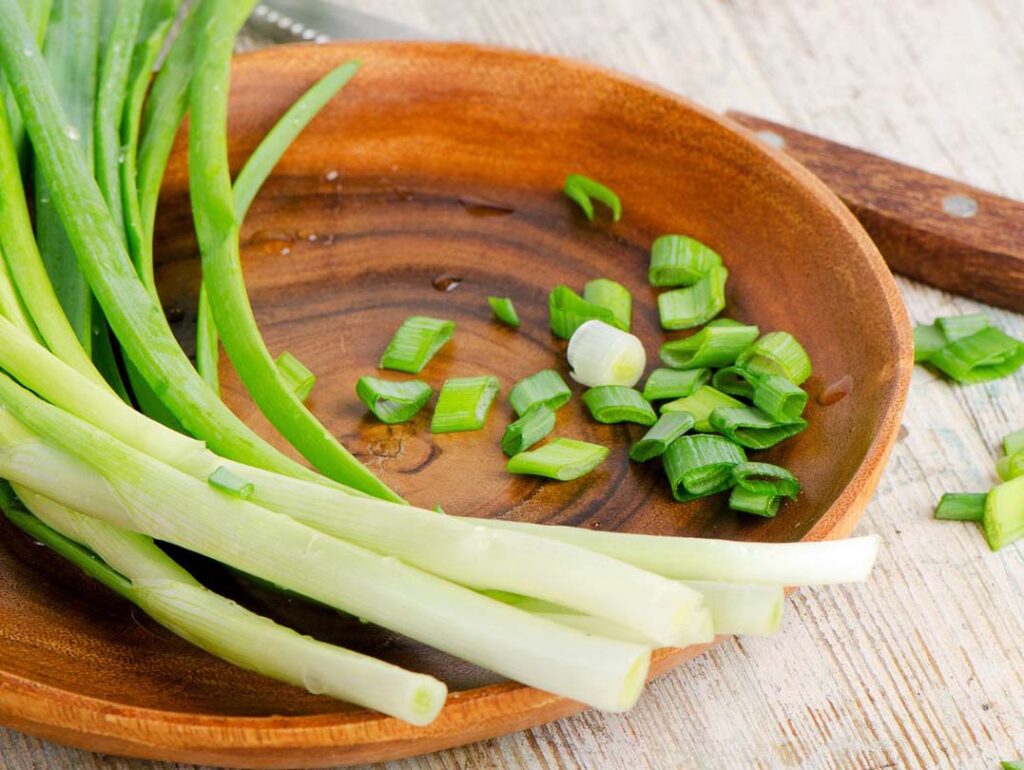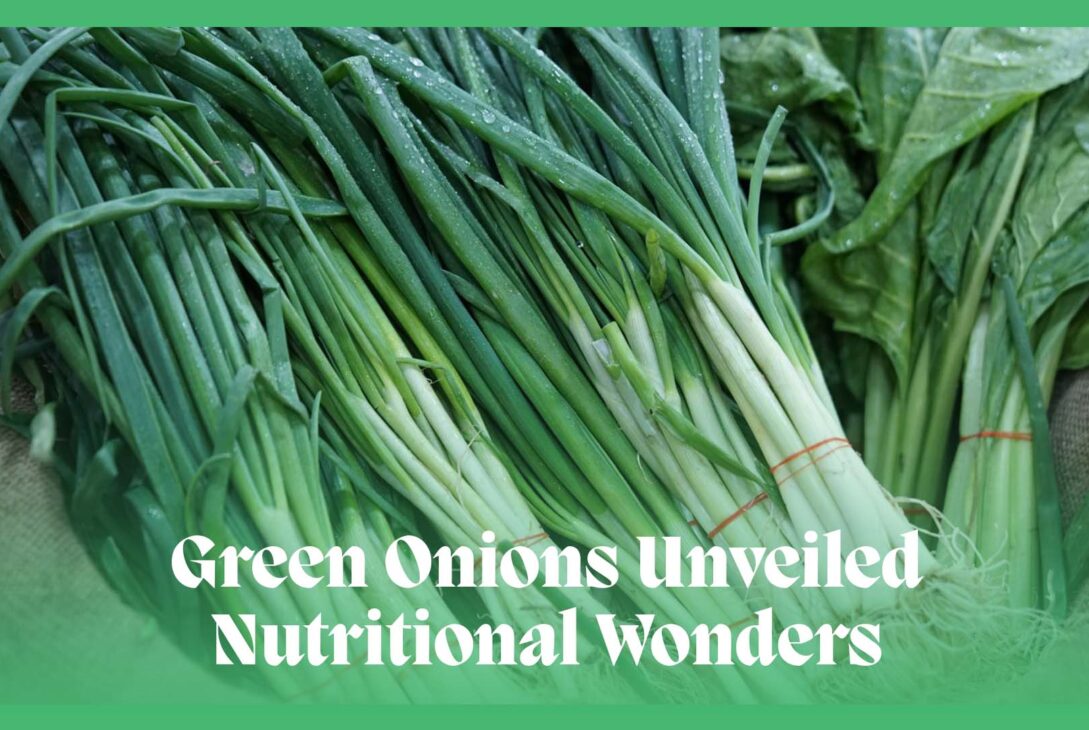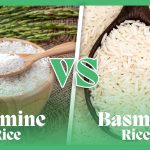Greetings from the verdant haven of nourishment! We’re exploring the colorful world of green onions in this culinary journey—those thin marvels that have become a staple in kitchens all across the world. Scientifically referred to as Allium fistulosum, green onions are the hidden stars of the culinary arts, native to Asia and winning praise all around the world for their adaptable beauty.
Also known as spring onions or scallions, these thin, colorful stalks add a hint of freshness to food and enhance it with a subtle onion taste. Comprising members of the allium family, these emerald beauties have become an essential fixture in kitchens throughout the globe, finding a home in a variety of cuisines ranging from Asian stir-fries to Latin American salsas. They mix in perfectly with salads, soups, and garnishes because of their mild flavor and crisp texture.
As we explore the world of green onions, be ready to enhance your culinary experience! We’ll discover the secrets of these colorful stalks that have gained popularity as a global culinary staple on this nutrient-rich adventure.
A brief exploration into their intriguing universe reveals not just their mild flavor and crisp texture, but also their enduring appeal across a wide range of culinary traditions. Green onions’ flexibility has taken over kitchens, from lending a punch to Asian stir-fries to garnishing robust soups and salads in Western cuisine.
Come along as we explore the world of crisp, aromatic green onions, learning their secrets and the many ways that they have won over the palates and hearts of foodies everywhere.

Nutritional Composition:
The colorful superheroes of the food world, green onions are a nutritious powerhouse in addition to being mouthwatering. Flavorful and low in calories, only one serving of these green beauties adds a meager 32 calories to your diet. If you go further into the breakdown of macronutrients, you’ll find that green onions are a wonder food—they’re low in carbs but unexpectedly high in dietary fiber, which makes them a great option for anyone watching their carb consumption.
Proteins, which are important for building and maintaining muscle, are the main ingredient with 1.8 grams, while fats are present in smaller amounts but add to the overall deliciousness.
| Nutrient | Amount per 100 grams |
|---|---|
| Calories | 32 kcal |
| Macronutrient | |
| Carbohydrates | 7.3 g |
| Protein | 1.8 g |
| Fat | 0.2 g |
| Sugars | 2.1 g |
| Dietary Fiber | 2.6 g |
| Micronutrients | |
| Vitamin C | 13.2 mg |
| Vitamin A | 1012 IU |
| Vitamin K | 207 µg |
| Folate (B9) | 64 µg |
| Calcium | 72 mg |
| Iron | 1 mg |
| Potassium | 276 mg |
Role in Human Nutrition:
See how delicious green onions can be! These greens are high in nutrients and add taste. Let us investigate the crucial function that green onions play in maintaining the flavor and healthfulness of our meals.
Supports Immune System:
The main reason why green onions are immune system heroes is because of their high vitamin C levels. The immune system depends on vitamin C to help the body fight off infections and diseases. Studies highlight the role that vitamin C plays in supporting the immune system. (1, 2) Further research has revealed that green onions also include other immune-boosting substances such as sulfur compounds and quercetin, which further enhance their immune-supporting qualities. (3, 4)
Promote heart health:
Including green onions in your diet can help promote heart health in a tasty way. Green onions have been shown in studies to have a beneficial effect on cholesterol and blood pressure. Studies highlight the cardiovascular advantages linked to eating green onions, which makes them a great option for people who want to keep their cardiovascular health in check. (5, 6)
Maintain overall health:
Scallions, sometimes referred to as green onions, are a remarkable source of health benefits, mainly because of their potent antioxidants. Antioxidants are essential for lowering oxidative stress in the body and protecting cells from harm brought on by free radicals. Studies demonstrate the importance of antioxidants in preserving general health and averting a range of illnesses. (7)
Aid in weight management:
A balanced diet that includes green onions may help with weight management. Because of its high fiber content and low-calorie count, it makes you feel fuller for longer, which may help you consume fewer calories overall. Studies look at the connection between eating vegetables and managing weight. (8)
Prevent arthritis:
Green onions include flavonoids and sulfur compounds, which provide them with anti-inflammatory qualities. These substances could lessen inflammation in the body, which might assist with ailments like arthritis. (9)
Improves gut health:
As they include fiber, green onions help maintain a healthy digestive system. Fiber encourages regular bowel movements and helps avoid constipation, both of which contribute to the maintenance of a healthy digestive tract. Research highlights how important dietary fiber is for maintaining gut health.
Adverse effects:
When exploring the nuances of green onions, it’s important to be aware of any possible negative consequences. Among these, some people may develop allergies to green onions, which highlights the significance of moderation and knowledge.
Allergic reactions:
Some people may have allergies to onions, even to green onions. From minor symptoms like swelling or itching to severe reactions like breathing difficulties, allergic reactions can take many different forms. It’s critical to get medical help as soon as possible if you think you may have an onion allergy.
Abdominal discomfort:
Fructans, a kind of carbohydrate that some individuals find uncomfortable in their stomachs, are present in green onions. After eating green onions, those with fructose malabsorption or irritable bowel syndrome (IBS) may have gas, bloating, or pain in their abdomen.
Heartburn:
Green onions are one of the hot, highly flavored meals that might make acid reflux or heartburn sufferers’ symptoms worse. Onion’s high sulfur content may be a factor in this outcome.
Drug Interaction:
Certain drugs may have interactions with green onions. For instance, because vitamin K aids in blood clotting, those using blood thinners (anticoagulants) should use caution while consuming green onions.
Contamination risk:
Like other raw veggies, green onions can become contaminated with germs like E. Coli or Salmonella. Handling and washing properly can help reduce this danger. Pregnant women, elderly people, and anyone with weakened immune systems should exercise extra caution while ingesting raw or undercooked green onions.
Green onions are a nutritional powerhouse that offers a plethora of health advantages in addition to being a gastronomic marvel. These thin green marvels deserve a place on our plates with enthusiasm, thanks to their antioxidant power that protects our cells, heart fortification, immune system support, aids in digestion, and provides an assortment of critical minerals. Green onions add taste and support a healthy, balanced diet whether you whisk them into soups, add them to salads, or use them as a colorful garnish.
Thus, let’s honor the adaptability and vivacity of green onions—a little but remarkable addition to our food repertory and a verdant lighthouse pointing the way toward a tastier, healthier existence!
References:
- https://doi.org/10.3389/fimmu.2020.01451
- https://doi.org/10.1016/j.ccell.2018.07.014
- https://doi.org/10.1016/j.redox.2022.102511
- https://doi.org/10.1089/jmf.2012.2275
- https://doi.org/10.1002/mnfr.201400496
- https://doi.org/10.7314/apjcp.2013.14.7.4131
- https://doi.org/10.1007/s10068-014-0084-6
- https://doi.org/10.1080/10408398.2011.642029
- https://doi.org/10.5114/pg.2015.52753








